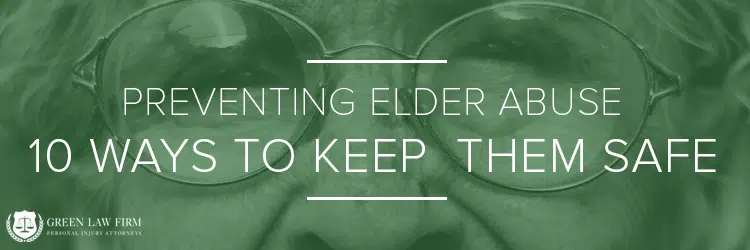If you have a loved one who is about to move to a nursing home, or whom is already residing in a residential care facility, you may be wondering how to prevent elder abuse and neglect? The number of incidents of elder care abuse and statistics in this country is startling. The truth is that YOU are your loved one’s best advocate for safe and reliable care. Care with dignity and respect. Here are ten things you can do to help assure someone you love is not the victim of nursing home abuse.
10 Solutions to Elder Abuse that Start With You
There is no guarantee anyone can give that will keep your loved ones safe while in a nursing or elder care facility. There are, however, things that you can do to create as safe an environment for them as possible.
Peace of mind starts with planning
10. Be involved in their care planning from the beginning.
The best time to start assuring your loved one’s safety is before the “emergency” need for their care arises. As they age, make sure you discuss what kind of care they would like to receive; will they stay at home as long as possible? Get assistance during the day? Keep your aging loved one as involved in their care process as possible.
9. Do due diligence when you research.
First and foremost, ask around in your community for the suggestions of friends and trusted advisors who may also know someone receiving care.
- Start by making sure that any facility you look at is certified by the Centers for Medicare and Medicaid Services (CMS) and assure that they have received a high rating on five-star quality training.
- Outside review agencies like US News and World Report also offer a ranking and review system for nursing and elder care facilities.
- Check the financials of the facilities you are considering; do things appear to be on the “up and up?”
- Make sure the facility has a higher staff-to-resident ratio to assure that caregivers are not overworked and overscheduled.
8. Visit. Visit again. And then visit more.
When you visit a care facility, don’t just go once; if you have the time, in advance, visit on several occasions and at different times and days of the week. The more “natural” a state you can observe the home, the more likely you will be to see what the atmosphere is like in its organic reality.
Be the best advocate you can be while they receive care
7. Asset yourself with kind strength right from the start.
- From the moment your loved one moves in, assert your role with fair, but assertive, strength,
- Be aware of what their care plan is and get a second opinion from a medical professional before admittance occurs so you can be sure they are getting the type of care that is best for them.
- Be on a first-name basis with the staff of every shit that cares for your loved one.
- Communicate what your loved one likes and dislikes in advance; when a staff member does something exceptional, offer them praise and tell their supervisor.
6. Know the chain of command and policies.
Educate yourself as to the policies for registering a concern or discussing an issue. When you have a concern, be proactive and don’t wait. Speak up as soon as you believe there is an issue!
5. Keep the staff on their toes!
Vary your visiting times so that your presence looking after your loved one will not be expected.
- Visit them at different times of the day, days of the week, and on holidays.
- Visit during mealtimes, during activities and at night as well.
4. Monitor their care.
Stay connected to the doctors, staff and administrative personnel who are all involved in your loved ones care.
- Understanding abuse in nursing homes can look like many things, familiarize yourself with signs to watch for.
- Make observations for yourself when visiting.
- What is their room like?
- What is their hygiene like?
- Has their mood changed?
- Have they changed physically?
3. Take notes, keep accountability going.
There will be meetings to discuss updates and the progress of your loved ones care; attend every meeting.
- Make sure key administrative staff attend the meetings.
- Take notes at every meeting; when possible summarize them with clear written directive. Know:
- Who is responsible for the next steps,
- What the next steps are,
- By when the next steps are happening, and
- Why your loved one is getting the care they are receiving.
- Insist on measurable timetables with clear direction and assigned tasks.
2. Speak up.
Stay connected to the doctors, staff and administrative personnel who are all involved in your loved ones care. Never hesitate to ask for what your loved ones deserve. Honor your concerns, honor their comfort.
1. Get help.
If you feel like something is going on, get help from a nursing home abuse attorney or state-run organization that handles a formal complaint about your loved ones care.
When you believe your loved one is being neglected or abused, it is likely that your situation will be urgent and you will want help and relief for them immediately!

